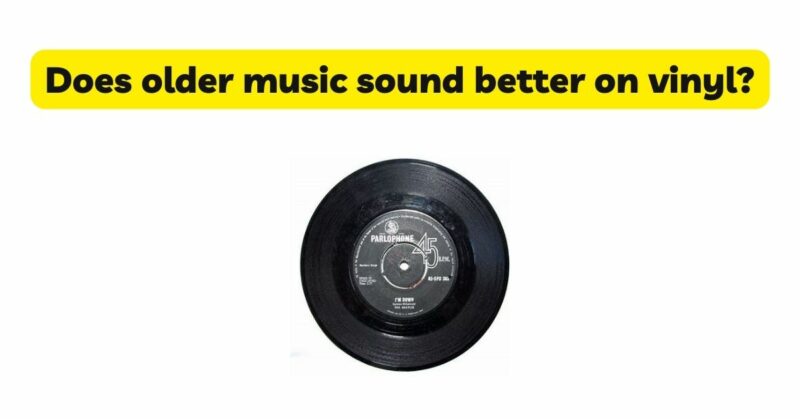The revival of vinyl records in recent years has sparked a renewed interest in the unique listening experience they offer. Many music enthusiasts argue that older music, particularly from the analog era, sounds better when played on vinyl. In this article, we delve into the question of whether older music truly sounds better on vinyl and explore the factors that contribute to this perception. We examine the characteristics of analog recordings, the mastering techniques employed during that time, and the subjective aspects of personal preference and nostalgia. By doing so, we aim to unravel the magic behind the captivating sound of older music on vinyl.
Analog Sound Characteristics: Music recorded during the analog era possesses a distinct sonic signature that many find appealing. Analog recordings capture the nuances and subtleties of the original performances, providing a warm and organic sound. The inherent imperfections of analog recordings, such as tape hiss and slight variations in speed, contribute to a sense of authenticity and intimacy that resonates with listeners.
Original Mastering Techniques: During the analog era, mastering processes were tailored specifically for vinyl. Mastering engineers utilized analog equipment and techniques to optimize the sound for the vinyl medium. The dynamic range, frequency response, and tonal balance were carefully adjusted to ensure the best possible playback on vinyl records. These meticulous mastering techniques of the past may lend themselves to the perception that older music sounds better on vinyl.
Vinyl as the Original Format: When older music was originally released, vinyl was the primary format for listening. The sound of the music was specifically tailored for vinyl playback, and the experience of listening to those songs on vinyl is seen as a more authentic and true representation of the artist’s intent. Vinyl provides a tangible connection to the past, allowing listeners to engage with the music in a way that feels closer to the original context.
Nostalgia and Personal Preference: Nostalgia plays a significant role in how we perceive and appreciate music. Older generations who grew up listening to vinyl records may associate the crackles, pops, and warm sound with fond memories of their youth. This emotional connection and sense of nostalgia can significantly influence their preference for older music on vinyl. Personal taste and the listener’s affinity for a specific era or genre also contribute to the perception that older music sounds better on vinyl.
Preservation of Original Recordings: Vinyl records provide an opportunity to preserve the original recordings from past decades. Reissues of older music on vinyl often strive to replicate the sound and aesthetics of the original releases, maintaining the integrity of the music. This dedication to preserving the authentic sound of older recordings contributes to the belief that vinyl is the best format for experiencing the music as intended.
Listener Engagement and Ritual: Vinyl records offer a unique listening experience that engages the listener on a deeper level. The act of physically handling the record, carefully placing it on the turntable, and gently lowering the stylus creates a ritualistic experience. This intentional engagement with the music can enhance the perception of the sound quality and overall enjoyment, making older music on vinyl a more immersive and fulfilling experience for many.
Conclusion: While it is subjective to claim that older music sounds better on vinyl, there are distinct elements that contribute to this perception. The analog sound characteristics, mastering techniques of the time, the original format of vinyl, nostalgia, and personal preference all play a part in shaping our perception of the music. Vinyl records provide a unique and immersive listening experience that allows us to connect with the past and engage with the music on a deeper level. Ultimately, the choice between vinyl and other formats comes down to personal taste and the desire to experience music in a way that resonates with individual sensibilities.


